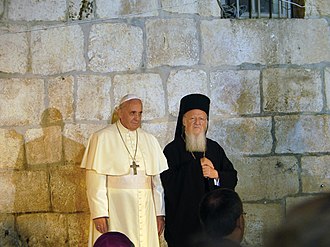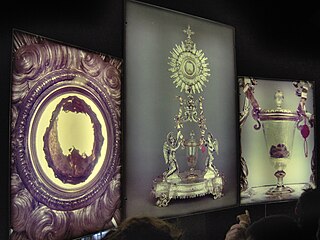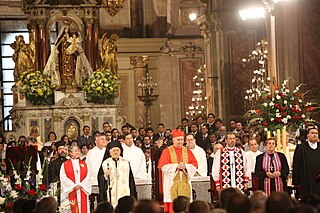
The Joint International Commission for Theological Dialogue Between the Catholic Church and the Eastern Orthodox Church was established by the Holy See and 14 autocephalous Orthodox churches.

The Joint International Commission for Theological Dialogue Between the Catholic Church and the Eastern Orthodox Church was established by the Holy See and 14 autocephalous Orthodox churches.
| |
| This article is part of a series on |
| Catholic–Eastern Orthodox relations |
|---|
| Overview |
The commission's first ten years of work reflected the growing consensus between the two communions and saw the publication of three agreed statements on such issues as the relationship between the Trinity, the Church and Eucharist; the sacraments of initiation and the connection between common faith and sacramental communion; and the theology of the ordained ministry. [1]
The commission has held the following plenary sessions:
The seventh plenary session took place from June 17 to 24th, 1993. According to the Communique, also known as the Balamand declaration, the dissolution of the Soviet Union and the attendant collapse of the Warsaw Pact in Central and Eastern Europe brought about "profound changes... involving the rebirth of religious liberty and the resumption of open pastoral activity by the Oriental Catholic Churches". [7] The session declared that these changes had "made these questions the touchstone of the quality of the relations between the Catholic and the Orthodox Churches." In particular, the question of Uniatism became the focus of attention.
The eighth plenary session took place from July 9 to 19th, 2000 and centered on the theme of the "Ecclesiological and Canonical Implications of Uniatism" [8]
The ninth plenary session of the commission was held from 18 September to 25 September 2006 in Belgrade, Serbia.
The theme discussed was "Conciliarity and Authority in the Church". Following the session, Pope Benedict XVI visited Patriarch Bartholomew at Phanar on 30 November 2006. [9]
The tenth meeting took place in Ravenna, Italy from October 8 to 14th, 2007.

Transubstantiation is, according to the teaching of the Catholic Church, "the change of the whole substance of bread into the substance of the Body of Christ and of the whole substance of wine into the substance of his Blood. This change is brought about in the eucharistic prayer through the efficacy of the word of Christ and by the action of the Holy Spirit. However, the outward characteristics of bread and wine, that is the 'eucharistic species', remain unaltered." In this teaching, the notions of "substance" and "transubstantiation" are not linked with any particular theory of metaphysics.
Full communion is a communion or relationship of full agreement among different Christian denominations that share certain essential principles of Christian theology. Views vary among denominations on exactly what constitutes full communion, but typically when two or more denominations are in full communion it enables services and celebrations, such as the Eucharist, to be shared among congregants or clergy of any of them with the full approval of each.

The Eastern Catholic Churches or Oriental Catholic Churches, also called the Eastern-rite Catholic Churches, Eastern Rite Catholicism, or simply the Eastern Churches, are twenty-three Eastern Christian sui iuris (autonomous) particular churches of the Catholic Church, in full communion with the Pope in Rome. Although they are distinct theologically, liturgically, and historically from the Latin Church, they are all in full communion with it and with each other.

The East–West Schism was the break of communion which occurred in the 11th century between the Catholic Church and Eastern Orthodox Church. Immediately following the schism, it is estimated that Eastern Christianity comprised a slim majority of Christians worldwide, with the majority of remaining Christians being Catholic. The schism was the culmination of theological and political differences which had developed during the preceding centuries between Eastern and Western Christianity.

In Christian theology, ecclesiology is the study of the Church, the origins of Christianity, its relationship to Jesus, its role in salvation, its polity, its discipline, its eschatology, and its leadership.

Papal primacy, also known as the primacy of the bishop of Rome, is a Christian ecclesiological doctrine concerning the respect and authority that is due to the pope from other bishops and their episcopal sees. The doctrine is accepted at a fundamental level by both the Catholic Church and Eastern Orthodox Church, though the two disagree on the nature of primacy.

In Christian theology, the term Body of Christ has two main but separate meanings: it may refer to Jesus' words over the bread at the celebration of the Jewish feast of Passover that "This is my body" in Luke 22:19–20, or it may refer to all individuals who are "in Christ" 1 Corinthians 12:12–14.

Sacred mysteries are the areas of supernatural phenomena associated with a divinity or a religious belief and praxis. Sacred mysteries may be either:

In Christianity, a Eucharistic miracle is any miracle involving the Eucharist. In the Roman Catholic, Lutheran, Eastern Orthodox, Methodist, Anglican and Oriental Orthodox Churches, the fact that Christ is really made manifest in the Eucharist is deemed a Eucharistic miracle; however, this is to be distinguished from other manifestations of God. The Catholic Church distinguishes between divine revelation, such as the Eucharist, and private revelation, such as Eucharistic miracles. In general, reported Eucharistic miracles usually consist of unexplainable phenomena such as consecrated Hosts visibly transforming into myocardium tissue, being preserved for extremely long stretches of time, surviving being thrown into fire, bleeding, or even sustaining people for decades.

Catholicity is a concept pertaining to beliefs and practices widely accepted across numerous Christian denominations, most notably those that describe themselves as catholic in accordance with the Four Marks of the Church, as expressed in the Nicene Creed of the First Council of Constantinople in 381: "[I believe] in one, holy, catholic, and apostolic Church."

The Catholic Church has engaged in the modern ecumenical movement especially since the Second Vatican Council (1962-1965) and the issuing of the decree Unitatis redintegratio and the declaration Dignitatis humanae. It was at the Council that the Pontifical Council for Promoting Christian Unity was created. Before that time, those outside of the Catholic Church were categorised as heretics or schismatics.
Uniatism, method of union of the past, and the present search for full communion, also known as the Balamand declaration and the Balamand document, is a 1993 report written by the Joint International Commission for Theological Dialogue Between the Catholic Church and the Orthodox Church during its 7th plenary session at University of Balamand's Balamand School of Theology in Lebanon. The report discusses ecclesiological principles and suggests practical rules for both the Catholic Church and the Eastern Orthodox Churches to implement about improving relations by reciprocally avoiding interfering in each other's Churches and not using history in a polemical manner. According to Cardinal Edward Cassidy, the report contains three principles: that individuals have the freedom to follow their conscience, that Eastern Catholic Churches have the right to exist, and that uniatism is not the current method of full communion; and two conclusions: that the Catholic Church and the Eastern Orthodox Churches are "Sister Churches" and that rebaptism should be avoided. The Eastern Catholics rejected the report "because it seemed to imply they should never have existed in the first place" while the Eastern Orthodox rejected it because it did not call for the abolition of the Eastern Catholic Churches.
The Declaration of Ravenna is a Roman Catholic–Eastern Orthodox document issued on 13 October 2007, re-asserting that the bishop of Rome is indeed the first among the patriarchs, although future discussions are to be held on the concrete ecclesiological exercise of papal primacy. The document was issued at the tenth plenary session of the Joint International Commission for Theological Dialogue Between the Catholic Church and the Orthodox Church held from 8 to 14 October 2007 in Ravenna, Italy.

The Catholic Church and the Eastern Orthodox Church have been in a state of official schism from one another since the East–West Schism of 1054. This schism was caused by historical and language differences, and the ensuing theological differences between the Western and Eastern churches.
The division between the Oriental Orthodox Churches and the Catholic Church can be traced to the years following the Council of Chalcedon (451) whose Christological teaching the Oriental Orthodox did not accept. Attempts were made to reconcile with some of the Oriental Orthodox Churches at the Council of Florence (1438-1445), but none of these provided a lasting solution. Relations began to improve dramatically, however, after the Catholic Church's Second Vatican Council (1962-1965). There were several important exchanges of visits between Popes and heads of the Oriental Orthodox Churches, and semi-official theological conversations sponsored by the Pro Oriente Foundation in Vienna. This process of reconciliation led to the establishment of an official dialogue between the Catholic and Oriental Orthodox Churches in 2003.

Catholic–Orthodox ecclesiastical differences are differences between the organizational structure and governance of the Eastern Orthodox Church and that of the Catholic Church. These are distinguished from theological differences which are differences in dogma and doctrine. A number of disagreements over matters of Ecclesiology developed slowly between the Western and Eastern wings of the State church of the Roman Empire centred upon the cities of Rome and New Rome/Constantinople respectively. The disputes were a major factor in the formal East-West Schism between Pope Leo IX and Patriarch Michael I in 1054 and are largely still unresolved between the churches today.

There are seven sacraments of the Catholic Church, which according to Catholic theology were instituted by Jesus and entrusted to the Church. Sacraments are visible rites seen as signs and efficacious channels of the grace of God to all those who receive them with the proper disposition.

A sacrament is a Christian rite recognized as of particular importance and significance. There are various views on the existence and meaning of such rites. Many Christians consider the sacraments to be a visible symbol of the reality of God, as well as a channel for God's grace. Many denominations, including the Catholic, Lutheran, Anglican, Methodist, and Reformed, hold to the definition of sacrament formulated by Augustine of Hippo: an outward sign of an inward grace, that has been instituted by Jesus Christ. Sacraments signify God's grace in a way that is outwardly observable to the participant.
Canon 844 is a Catholic Church canon law contained within the 1983 Code of Canon Law, which defines the licit administration and reception of certain sacraments of the Catholic Church in normative and in particular exceptional circumstances, known in canonical theory as communicatio in sacris.
Catholic–Eastern Orthodox relations have warmed over the last century, as both churches embrace a dialogue of charity. The Second Vatican Council (1962-1965) ushered in a new era of relations for the Catholic Church towards the Eastern Church, fondly describing the Orthodox as “separated brethren” with valid sacraments and an apostolic priesthood. The Orthodox Church, on the other hand, encouraged local churches to prepare for future dialogue in the Third Pan-Orthodox Conference in Rhodes (1964), and has since engaged in several ecumenical efforts with the Vatican. Significantly, in 1965 Pope Paul VI and Ecumenical Patriarch Athenagoras I of Constantinople mutually lifted their respective excommunications.